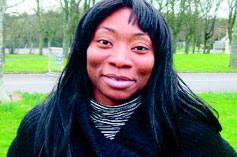THE STRESS and mundanity of life in an asylum seeker centre has inspired a Nigerian woman to write a prize-winning short story.
Mother-of-one Melatu Okorie (33), who is based at the Mosney asylum seeker centre in Co Meath, this week collected first prize in a literary competition judged by Booker Prize-winning novelist Roddy Doyle.
Okorie, from Enugu State in eastern Nigeria and living at Mosney for three years, came first out of nearly 40 entries to the Metro Éireann Writing Award scheme, which is open to immigrants and people of immigrant backgrounds.
Her winning short story, Gathering Thoughts, is told through a Nigerian teenage girl whose family move from city to village life, whereupon she is forced to undergo circumcision.
“She meets her paternal grandmother who is very harsh, the matriarch of the whole family – she bosses everyone around,” explains Okorie. “The girl hopes her father will be there to help her with the transition into village life but the father just reverts back to this man who does whatever his mother wants him to do.
“Everyone is at the mercy of her grandmother. And she has to go through female circumcision, and so many other things – a lot of the traditional customs she has to face, which is an eye opener for her.”
Okorie, who studied English at university back in her native country, revealed to Metro Éireann that she was encouraged by a counsellor at Mosney to channel her frustration and stress into creative outlets such as writing, and one night she stayed up until early morning crafting Gathering Thoughts, which is set in Nigeria’s Igboland.
Her Igbo culture has grown ever more important to her since coming to Ireland, she explained, especially as she wants to keep alive the Igbo traditions and stories for her three-year-old daughter Nadia.
“After I had my daughter, I wanted her to hear the things my mother told me. If she’s crying and I’m carrying her I’m usually singing Igbo songs to her, even though she might not know the words. I think the first story I actually did was of a Nigerian child born in Ireland going back home. I think I was writing things for her.”
Sometimes the time and motivation to write isn’t there, adds Okorie, who is nevertheless an avid reader. A favourite author at the moment is fellow Nigerian Chimamanda Ngozi Adichie, who was also raised in Enugu State. Adichie’s second novel, Half of a Yellow Sun, won the 2007 Orange Prize for Fiction.
Okorie admits that she’s also been partial to a crime novel or two, but shuns “frivolous” chick-lit books which centre on affairs and shopping. She often finds herself reading about people who, like herself, have migrated from their home countries to another land and another culture.
The Nigerian woman, who did not wish to discuss the nature of her asylum claim, sources reading material from friends and staff at Mosney, and at Drogheda Library.
According to judge Roddy Doyle, the overall standard of entries to this year’s competition was very high.
He told Metro Éireann: “There was some great writing among this year’s entries, and a great variety of styles and subjects – stories of hardship, and hope; frightening accounts of journeys made; poetry laced with anger, or joy. There was funny writing, and writing that was deeply unsettling. All the entries were a pleasure to read.”
Okorie picks up a cheque for €5,000 for her winning entry.
A full report on the Metro Éireann Writing Award ceremony in Dublin will appear in next week’s edition, including details of next year’s competition.












